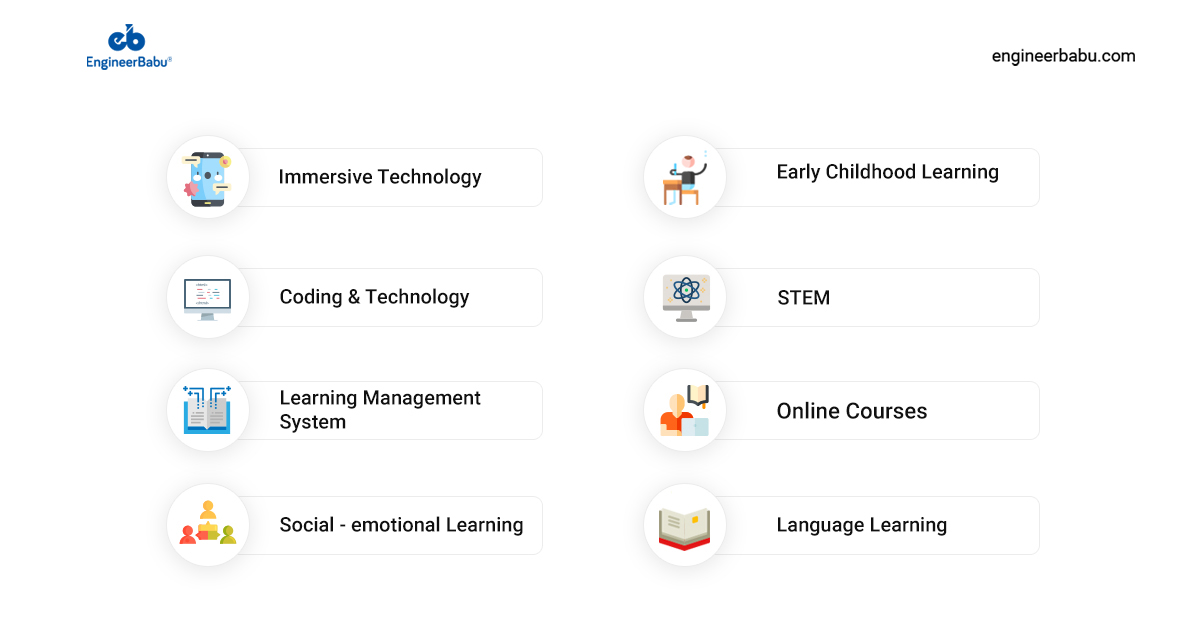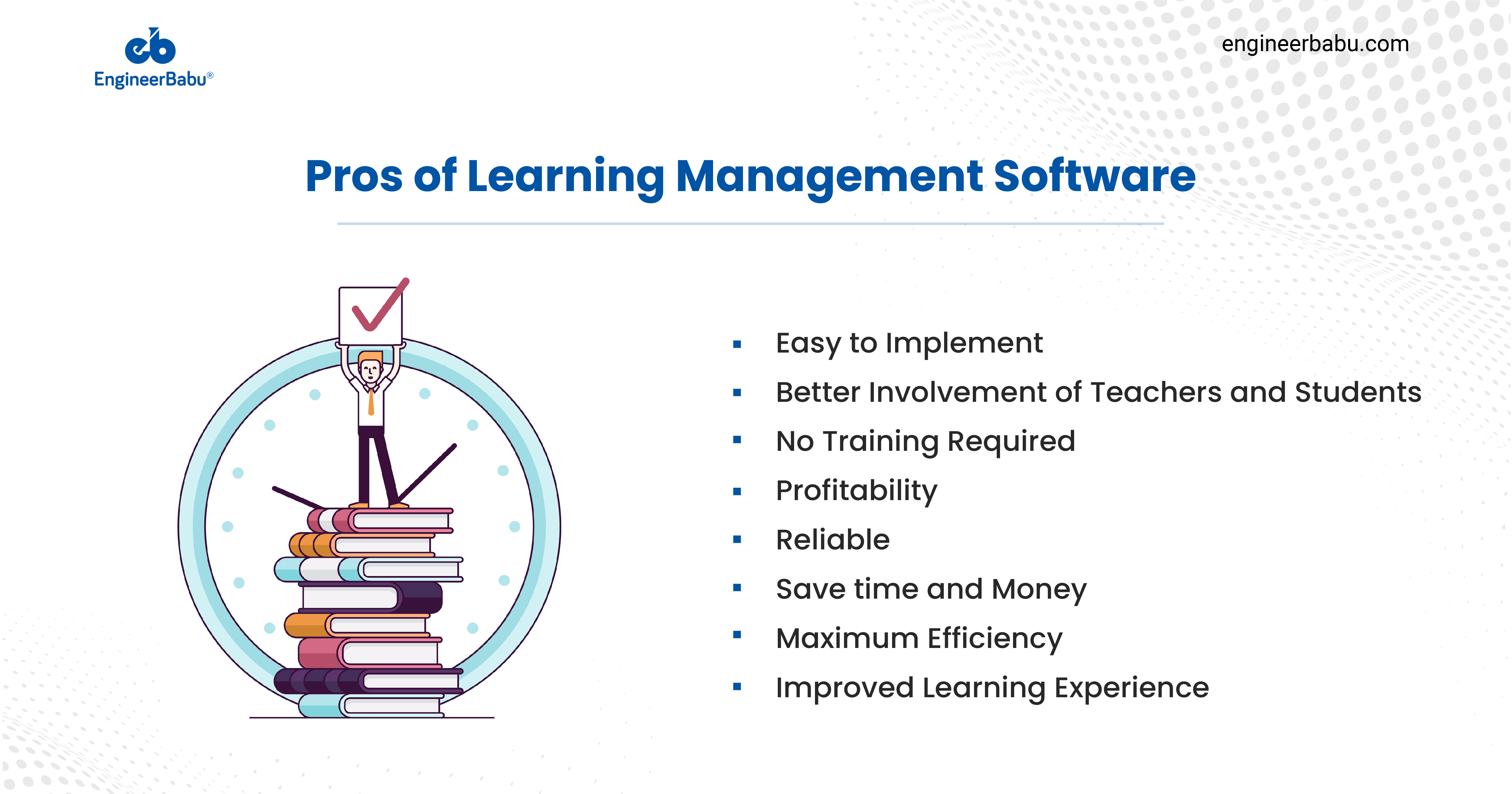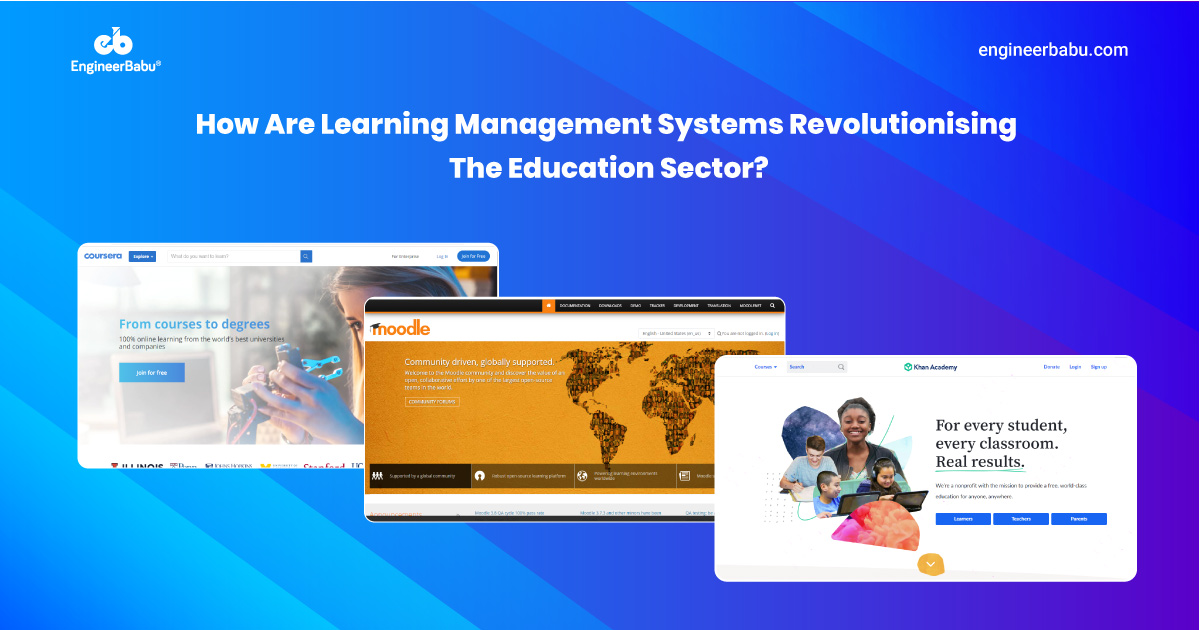Recently, there has been an international revolution in the higher education system. The process is getting structural and functional reformation with new experiments. One of these is gaining massive popularity amongst students and educational institutes alike: Learning Management System.
LMS or Learning Management System consists of innovative tools to promote positive profound growth in EdTech (EduTech) industry. It basically involves adopting, creating, administering, distributing and managing e-learning training. Certainly, these are qualitatively efficient enough to completely replace classroom learning.
The EduTech Landscape with Learning Management System:

The 21st century has facilitated applied technology methodologies in almost every sector. With brands like Moodle, Khan Academy & Coursera, the edutech sector has witnessed tremendous growth in the last one decade. The education provided via these online learning methods is much more experiential, simple, personalised and interactive than traditional methods.
eLearning Cuts Energy Consumption By 90% And Slashes CO2 By More Than 85%
This doesn’t come as a surprise. Figures from a study conducted by an Open University suggest that eLearning is a far greener and more efficient method of training rather than the traditional methods. By integrating Learning Management System, we can use eLearning as an essential pillar in our global fight against climate change.
According to statistics, revenues in the eLearning industry have grown by more than 900% since 2000. Also, the global eLearning market will reach $325 billion by 2025! Technology is drastically redefining the learning experience by new ways of learning. These include (but are not limited to): self-paced learning, remote mentoring and live coaching via web and mobile platforms.
Also Read: Education Finder App: App For Abroad Education Guidance
Online learning also promotes a comprehensive and personalised management of education. It not only enhances multimedia content for virtual classrooms, but also promotes higher and adult education via online tutoring. Offered to both, teachers and students, Learning Management System is a basic structure for a unique virtual campus platform.
As of today, 941 universities from across the world are actively engaging in offering MOOC to their students. MOOCs first became available by institutes like Stanford, MIT and Harvard and have become widespread. (MOOC refers to Massive Open Online Courses that are offered by these prestigious institutes.)
Why are big universities in favour of LMS and MOOCs?
Stanford professors Andrew Ng and Daphne Koller founded Coursera, after a thorough research about the student preferences. Interestingly, leading universities including Stanford, Harvard, Yale, MIT, IITs and firms like Google, Microsoft, etc all have MOOCs. And they were in fact, one of the first universities to experiment with the concept.
If we talk about the reasons why Coursera first came up in the mind of those two professors, it’s quite thoughtful. Daphne in one of her TED Talks mentioned the infamous stampede at a South African University, that arose as a result of the higher education crisis. You can learn more about the vision behind Coursera from this video:
This brings us to another question. Why are universities in favour of these courses?
There’s a report released by Brown University and Columbia University after interviewing administration and faculty from over 80 institutes offering MOOC. The idea behind this report was to determine why institutions offer MOOCs. Some of the interviewees believed that improvement had occurred within the MOOC format offered by these LMS.
About 38% of institutions expected LMS to lead to improvements in educational outcomes.
Conclusively, universities prefer MOOCs for numerous reasons. Udacity and Coursera offer paid degree-granting MOOCs. The majority of the courses are still free and open to everyone. These courses do not only allow universities to extend reach and access but also contribute towards building a brand. It also brings innovation and research to teaching and learning.
The Various Verticals of Learning Management System:
What is an LMS used for?
Learning management systems deploy, centralise and measure all learning activities. An excellent learning management system will support a variety of internal and external corporate use cases. This can include:
- Employee Onboarding, Development and Retention:
The most common LMS use is supporting new employees with their initial on-boarding. You can bring newcomers up-to-speed on the company’s learning culture by providing them opportunities. It includes consuming relevant materials across multiple devices, contributing their own knowledge, and being recognised for it. One more common LMS use is supporting the training and development of current employees. Courses can be assigned within the LMS to ensure that employees acquire the right job skills, are well informed about product changes and are up-to-date on compliance training, etc.
- Customer, Partner & Member Training:
Additionally, LMS provides organisations with training to customers. Most importantly, software and technology companies looking forward to effectively onboard users to make them use their product also use LMS. Ongoing customer training provides more value to customers and prevents the customer churn. It is a great way to enhance partnership programs and providing more value to the partners. Learning Management System is commonly used to amplify membership value. It’s done by creating a centralised content and facilitating the engagement among members with digital learning.
- Compliance Training & Sales Enablement:
Consequently, LMS is used to make sure that employees receive the mandated training and manage the recurring certification and training programs. The centralised approach mitigates all risks and helps in avoiding any potential regulatory compliance issues. Learning Management System is central to enabling sales at scale by preparing the sales person with the knowledge they need, exactly when they need it. The platform speeds up the on-boarding so that new hires can start selling sooner, and ensures that you retain your top performers.
How is learning management system different from the traditional teaching methods?

Easy to implement with better involvement of teachers and workers:
LMS is a piece of software which is easy to implement in your educational centre. It brings together under one platform all academic programs, subject study guides and training, which thanks to technical support from the providers and developers of LMS platforms, is done easily.
For a student community to perform or function well, be it at school or university, it needs efficient access to information. Classrooms or virtual campuses act as support and a channel of communication, for teachers and students alike, when going forward with an educational project or virtual learning.
LMS are reliable and require no training:
It’s a structured technology whose objective is to make the lives of users much easier and pleasant thanks to its user friendliness. An intuitive tool which doesn’t require training or a manual; students and teachers alike can take to it like a duck takes to water. LMS are easy to learn how to use, including using new tools or features which you may not have used previously.
Educational platforms allow complete personalised access to all members of its community, just like the support received in a classroom environment. In these comprehensive virtual campuses it is easy for all users to find the communication tools they need, such as those for making presentations or resource mapping, internally or from the internet. Reliability is ensured.
Portability, saves time & money:
It’s possible to access the LMS from anywhere with an internet connection from any device, be it a computer, smartphone or tablet. If a teacher needs to give a revision class they can connect with all the students through a virtual classroom, or if a student is away on holiday or travelling they can access the class content and exercises anywhere.
Having all information in the same place is a strong argument for using an LMS, avoiding loss of data and information and making it available to all users in one place. Educational platforms allow the complete management of everything related to teaching, saving time and money. Educational centres can duplicate classes with the same teachers and exploit the most of each SCORM compliant online course, using it again and again.
Maximum efficiency while improving the learning experience:
Thanks to these platforms it’s not only the administrators who benefit. Given the simplicity and efficiency provided in all processes, teachers and students can exploit the most of the online learning process with an LMS.
The possibilities for personalisation are unlimited and can fit to any educational centres’ needs, for example an LMS can contain: chat, virtual classes, forums, multimedia content, interactive content, supportive resources for the student, individual monitoring, group monitoring, evaluation and analysis through reporting and much more, making for maximum efficiency.
This is the ultimate goal of any virtual campus that we have spoken about previously. LMS are not only a virtual space created for learning, but make learning a more complete experience.
In conclusion, these learning platforms are potentially fitting for the educational sector for any materials from languages or I.T to humanities and social sciences etc. The results of training and education with the support of an LMS guarantee successful training as well as motivating students.
To sum up…
An organisation or institute needs to have a centralised content management system, in-depth pedagogy and thorough assessment methods to create unique learning experiences. For learners, learning management, tracking, personalisation and analytics help learners augment their current learning experience.
When it comes to e-learning, EngineerBabu has it’s mantra: Learn, Communicate, Collaborate! In addition to being a web space for learning, free online courses contribute towards making higher education an actual hands-on learning experience. With rampant technology in classrooms, students are increasingly becoming digital junkies.
EngineerBabu is an IT startup based in Indore (India) with a wide recognition from trustworthy sources. We have a vast experience in building tech products for multiple domains: food delivery, travel, business networking, edutech, health and fitness, service providers, etc.
When it comes to edutech, our team has worked on multiple successful projects. Our clients include WitCircle, Uskill, Education Finder, Mentrio and ATMC University‘s Mobile App. All of these projects were very different from each other. You can even take a look at our extended portfolio here.
If you have any amazing ideas that you would like to collaborate with us on, drop an email at [email protected]. You can also just without having to wait. We hate waiting as much as you. We will get back in touch very soon!
Liked the article? Let us know in the comments section below.
Handpicked Reading for you:
- Mentrio: A Community to Find the right Mentor
- A-Z Guide For Developing A MOOC LMS (Like Coursera)
- How To Make An eLearning Mobile App Like Khan Academy (Or Udemy)

